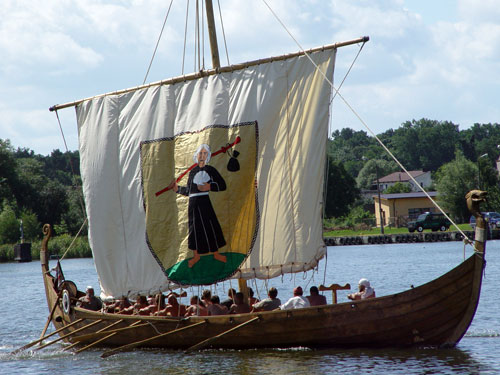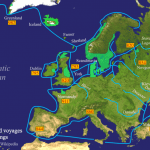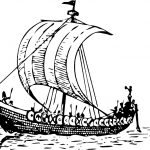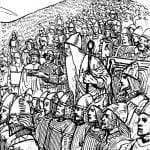While the Vikings had the runic alphabet, they didn’t have written history. Thus, we don’t know exactly why the Vikings began raiding in A.D. 793. Scholars have many theories about the reasons why the Scandinavians began leaving home on extensive raids, trading missions, explorations and settlement, which include:
- population pressures and not enough good farmland
- too many landless younger sons
- easy targets of unprotected, wealthy church properties and towns
- trade imbalances between European Christians and the pagan Vikings
- competition among chieftains in their native lands
- the lure of adventure in foreign lands
Population Pressures
Most scholars today agree that the population pressure theory doesn’t hold weight. As the Viking Age raids and trading brought more wealth into Scandinavian, the growing prosperity might have led to greater population growth. But a burgeoning population probably wasn’t a cause of the Viking Age.
Landless Younger Sons
The Vikings practiced primogeniture, which means the eldest son inherits everything and any younger sons nothing. Without land to farm, younger sons would need to find a way to make a living. This theory seems likely at least as one of the factors leading to the Scandinavian expansion into Europe.
Easy Targets
Vikings were not Christians, therefore, they saw no hindrance in attacking ecclesiastical centers such as monasteries. However, even in warfare, Christians did not attack properties of the Church—at least not often—so Church properties were unprotected. No doubt Vikings did see church properties as easy pickings, as the Church had grown very wealthy and usually had more wealth than even kings or merchants.
Trade Imbalances
While in previous times, Scandinavians had traded with Europeans readily, as Europe became more Christian, Christian traders began to refuse to trade with pagans or Muslims. This created problems for the Vikings, and perhaps they saw raids as a way of fixing those problems.
Power Struggles in Viking Lands
The Ynglinga saga, written by Iceland’s Snorri Sturluson, and based on earlier writings of Norwegian skalds, states that when Harald Fairhair brought Norway under his control, many minor chieftains decided to leave rather than live under the king’s rule. It seems likely that this was one of the causative factors of the Viking Age, as Vikings decided to go raiding or settle elsewhere.
Lure of Adventure
Vikings were bold, brave people who no doubt felt the lure of adventure in foreign lands. A strong Norse pagan belief was that each person’s fate was set by the Norns, and that death in battle is not only honorable, but the warrior will be taken to Valhalla by Odin, the god-father. With these beliefs, why not take chance into your hands and go raiding? After the first raid, the profitability would have been obvious to all.
This article is part of our larger selection of posts about The Vikings. To learn more, click here for our comprehensive guide to The Vikings.
Cite This Article
"Why Did the Viking Age Happen?" History on the Net© 2000-2024, Salem Media.
April 25, 2024 <https://www.historyonthenet.com/why-did-the-viking-age-happen>
More Citation Information.










